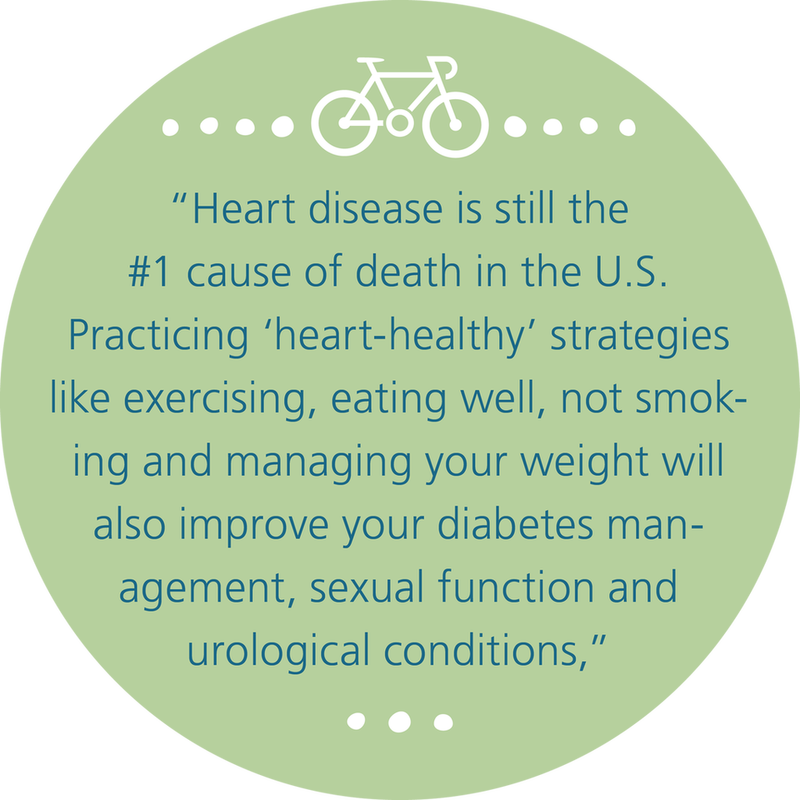| FEATURE |

Diabetes and urological health issues are closely connected. Diabetics are prone to urinary tract infections (UTIs), bladder issues and sexual dysfunction. Diabetes can often make your urologic conditions even worse because it can impact blood flow, nerves and sensory function in the body. Roughly 29.1 million people or 9.3 percent of Americans have diabetes.
Diabetes and its Impact on your Urinary and Sexual Health
Diabetes is a disease in which your blood glucose (blood sugar) levels are too high. Glucose is the body’s main source of fuel and comes from the foods you eat. After your body breaks down food, glucose enters the bloodstream. The cells in your body need this sugar for energy, but a hormone called insulin must be present for the glucose to enter the cells. Your pancreas, a large gland that sits behind the stomach, is what makes the insulin.
In people without diabetes, the pancreas makes the right amount of insulin to move the sugar from the blood into the cells. But, in people with type 1 diabetes, the body doesn’t make insulin at all. In people with type 2 diabetes, the body doesn’t make or use insulin the right way. This is called insulin resistance. Without enough insulin, glucose stays in the blood. Having too much of this in the bloodstream can harm your kidneys, eyes and other organs.
The A1C test is used by doctors to see how well you’re taking care of your diabetes. This blood test gives facts about a person’s blood sugar levels over the past two to three months. The American Diabetes Association suggests an A1C of 7 percent or below.
Bladder Conditions and Urinary Tract Infections (UTIs)
“Diabetes can affect the function and structure of the lower urinary tract, which in turn may play a role in patients with diabetes having more UTIs, overactive or underactive bladder, and problems with urination,” says Michael J. Kennelly, MD, Professor of Urology and Obstetrics & Gynecology at Carolinas Medical Center.
Over time, people with diabetes may lose sensory function. This can make it hard to know that you have to go to the bathroom. As a result, people may wait too long to go to the bathroom, or if the urine stays in the bladder too long, it may raise your chance for getting a bladder or kidney infection.
Sexual Dysfunction
Both male and female sexual dysfunction are impacted by diabetes because it impacts nerve and sensory function, as well as blood flow to the genital area. Women with diabetes may have a loss of sensory function or even vaginal dryness, which can cause pain during sex.
“Unfortunately, the research on female sexual dysfunction is not as established as the research on male sexual dysfunction. For example, there are about 20 treatments for men, but only 1 FDA-approved drug (Addyi (flibanserin)) to treat women with sexual dysfunction,” says Tobias Köhler, MD, Associate Professor of Urology at Southern Illinois University School of Medicine.
For men, treatments for erectile dysfunction include pills, devices such as penile implants or pumps, and surgery. Testosterone replacement therapy is also an option for some men.
Kidneys
Diabetes can also cause harm to the kidneys. In fact, diabetes is the most common cause of kidney failure, which is a type of kidney disease. Diabetic kidney disease is the medical term for kidney disease caused by diabetes. This health issue affects both kidneys at the same time. Swelling in parts of the body is a common sign of diabetic kidney disease, and people with later stages of the disease have a greater chance of being told they have kidney cancer.
The purpose of your kidneys is to filter and clean your blood. When your kidneys aren’t working the right way, you may have to go on dialysis. Damaged kidneys also impact the types of drugs that can be prescribed to you. This is because most drugs are absorbed in the kidneys or liver.

Lifestyle Factors
The good news for men and women is that healthy lifestyle factors can help with diabetes care, urological health issues and sexual function. These consist of eating a healthy diet, maintaining a healthy weight, working out, managing stress, getting enough sleep and not smoking.
One of the biggest concerns diabetics have is how to limit the carbohydrates (carbs) in their diet, which involves sugars, fiber and starchy foods. Taking charge of the amount of carbs in your diet makes a difference in keeping steady blood sugar levels (as you want to stay away from drastic changes in blood sugar levels). It’s a good idea to talk to a registered dietitian about what to eat. If you have diabetes, sessions with a registered dietitian are covered by most health plans. During the visit, you may go over such topics as how to read nutrition labels, manage portion sizes and count carbs.
Your Health Care Team
If you have diabetes and also have urology-related health problems, you may work with a primary care doctor (general medical expert), endocrinologist (diabetes expert) and a urologist (urinary system expert).
It’s important to work with your doctors to make a plan to keep your blood sugar levels in a healthy range and to arrange for an A1C test. This plan may involve a blend of lifestyle changes, oral medications and insulin. You should also feel empowered to talk to your doctors about sexual function and bladder control concerns, as your provider may not always ask about these “quality of life” issues.
Exciting New Research
Dr. Kennelly noted that scientists are looking into the use of muscle stem cell treatments for bladder problems. One such instance is a clinical trial for stress incontinence in women. A biopsy is taken from the thigh to get muscle stem cells. These muscle stem cells multiply for 6-8 weeks and are then injected into the bladder. After that, it takes about a year for them to regenerate in the bladder, with the hope of better overall bladder health. A different study will look at the use of stem cells for treating erectile dysfunction.
Other research has shown that testosterone replacement therapy for erectile dysfunction tends to work better in men who lose weight and keep a healthy weight.
What’s Good for Your Heart is Good for Everything Else
“Heart disease is still the #1 cause of death in the U.S. Practicing ‘heart-healthy’ strategies like exercising, eating well, not smoking and managing your weight will also improve your diabetes management, sexual function and urological conditions,” says Dr. Köhler.
To learn more about clinical studies for urological health issues or diabetes, visit clinicaltrials.gov.
UrologyHealth.org | SPRING 2017 | UROLOGYHEALTH extra